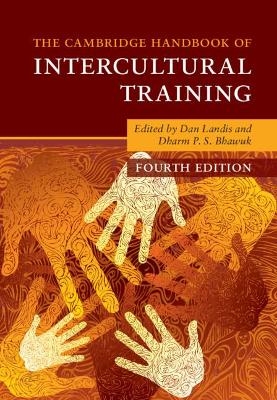
The Cambridge Handbook of Intercultural Training
Cambridge University Press (Verlag)
978-1-108-49056-6 (ISBN)
With the number of international migrants globally reaching an estimated 272 million (United Nations report, September 2019), the need for intercultural training is stronger than ever. Since its first edition, this handbook has evaluated the methodologies and suggested the best practice to develop effective programs aimed at facilitating cross-cultural dialogue and boosting the economic developments of the countries mostly affected by migration. This handbook builds and expands on the previous editions by presenting the rational and scientific foundations of intercultural training and focuses on unique approaches, theories, and areas of the world. In doing so, it gives students, managers, and other professionals undertaking international assignments a theoretical foundation and practical suggestions for improving intercultural training programs.
Dan Landis is Affiliate Professor of Psychology, University of Hawaii, and is founding President and Fellow of the International Academy for Intercultural Research. Dharm Bhawuk is Professor of Management, Culture, and Communication Psychology, University of Hawaii, and is also founding Fellow of the International Academy for Intercultural Research.
1. Introduction and Theoretical Framework Dan Landis and Dharm P. S. Bhawuk; Part I. Theoretical Foundations of Intercultural Training: 2. Harry Triandis's Contributions to Intercultural Training as a Field of Research: A Bibliometric Analysis Dharm P. S. Bhawuk and Atma P. Bhawuk; 3. Interdisciplinary History of Intercultural Communication Studies: From Roots to Research and Praxis Steve J. Kulich, Liping Weng, Rongtian Tong, and Greg DuBois; 4. Culture Theories and Intercultural Training Dharm P. S. Bhawuk; 5. An Analysis of Methods for Intercultural Training Sandra M. Fowler and Masa Yamaguchi; 6. Intercultural Simulations: Theory and Practice Michael B. Saltzman; 7. Toward a Social Network Theory of Reentry Ruobing Chi and Judith N. Martin; 8. Intractable Conflict, Delegitimization and Intercultural Training Meytal Nasie and Daniel Bar-Tal; 9. Evaluation of Cross-Cultural Training: A Review Anna Kallschmidt, Jessica Mesmer-Magnus, Chockalingam Viswesvaran and Satish Deshpande; Part II. Practice of Intercultural Training: 10. International Initiatives in K-12 and Higher Education: Learning from and Moving Beyond Disciplinary History Jennifer Mahon and Kenneth Cushner; 11. The Triad Training Model in Counseling, Cultural Diversity, and Intercultural Training Tomoko Yoshida; 12. Multicultural Counseling Training and Intercultural Training: A Synthesis Ben C. H. Kuo; 13. Training for Cross-Cultural Competence in the United States Military Sharon Glazer; 14. Developing Intercultural Competency Training in Global Organizations: An Examination of the Cadre of Global Managers Miriam Moeller and Michael Harvey; Part III. Indigenous Psychology and Intercultural Training: 15. Brazilian Cultural Patterns and Intercultural Training Cláudio V. Torres, Maria Cristina Ferreira, and Laura Novaes Andrade; 16. Russian Cultural Patterns and Intercultural Training Valerie Alexandra and Olga Kovbasyuk; 17. Indian Psychology and Intercultural Training Dharm P. S. Bhawuk; 18. Culture-Inclusive Theories for Intercultural Training in Confucian Societies: An In-Depth Analysis of Face Dynamism Rong Chen and Kwang-Kuo Hwang; 19. Japanese Psychology and Intercultural Training: Presenting Wa in a Nomological Network David Dalsky and Jueyun Su; Part IV. New Interdisciplinary Approaches to Intercultural Training: 20. Cultural Neuroscience Basis of Intercultural Training and Education Shihui Han and Ilari Erik Mäkelä; 21. Perceptual Representation: An Etic Observational Category for Guiding Intercultural Communication Adaptation Milton J. Bennett; 22. Emotional Contagion, Intimate Intercultural Relationships, and Intercultural Training Elaine Hatfield, Shari Paige and Richard L. Rapson; 23. Dialogue and Culture: Reflections on the Parameters of Cultural Dialogue Sthaneshwar Timalsina; 24. Optimizing Globalization through 'Intelligent Swarming': Suggested Activities for Training Gary Fontaine; Part V: Summing Up: 25. Intercultural Training for the New Global Village Dharm P. S. Bhawuk and Dan Landis.
| Erscheinungsdatum | 27.08.2020 |
|---|---|
| Reihe/Serie | Cambridge Handbooks in Psychology |
| Zusatzinfo | Worked examples or Exercises |
| Verlagsort | Cambridge |
| Sprache | englisch |
| Maße | 177 x 250 mm |
| Gewicht | 1470 g |
| Themenwelt | Geisteswissenschaften ► Psychologie ► Arbeits- und Organisationspsychologie |
| Geisteswissenschaften ► Psychologie ► Sozialpsychologie | |
| Wirtschaft ► Betriebswirtschaft / Management ► Personalwesen | |
| ISBN-10 | 1-108-49056-5 / 1108490565 |
| ISBN-13 | 978-1-108-49056-6 / 9781108490566 |
| Zustand | Neuware |
| Haben Sie eine Frage zum Produkt? |
aus dem Bereich


